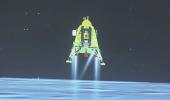Chandrayaan-3 mission's lander 'Vikram' chose a relatively flat region on the lunar surface to touch down, images captured by its camera showed.

Soon after Vikram, with four landing legs, successfully reached the Moon, these images captured by the Landing Imager Camera after the landing showed a portion of Chandrayaan-3's landing site. "Seen also is a leg and its accompanying shadow," ISRO noted.
"Chandrayaan-3 chose a relatively flat region on the lunar surface," the space agency said.
It also said a communication link was established between the lander and the space agency's Mission Operations Complex (MOX) here. The MOX is located at the ISRO Telemetry, Tracking and Command Network (ISTRAC).
ISRO also released images from the Lander Horizontal Velocity Camera taken during the descent to the Moon's surface.

Chandrayaan-3 mission's lander module on Wednesday touched down on the surface of the Moon.
The lander and the rover are designed to operate for one lunar daylight period (about 14 Earth days).
The lander has multiple sensors to ensure a safe touchdown, including an accelerometer, altimeters, Doppler velocimeter, inclinometer, touchdown sensor, and a suite of cameras for hazard avoidance and positional knowledge.
The lander carries the rover in a compartment with a ramp for deployment onto the Moon's surface.










